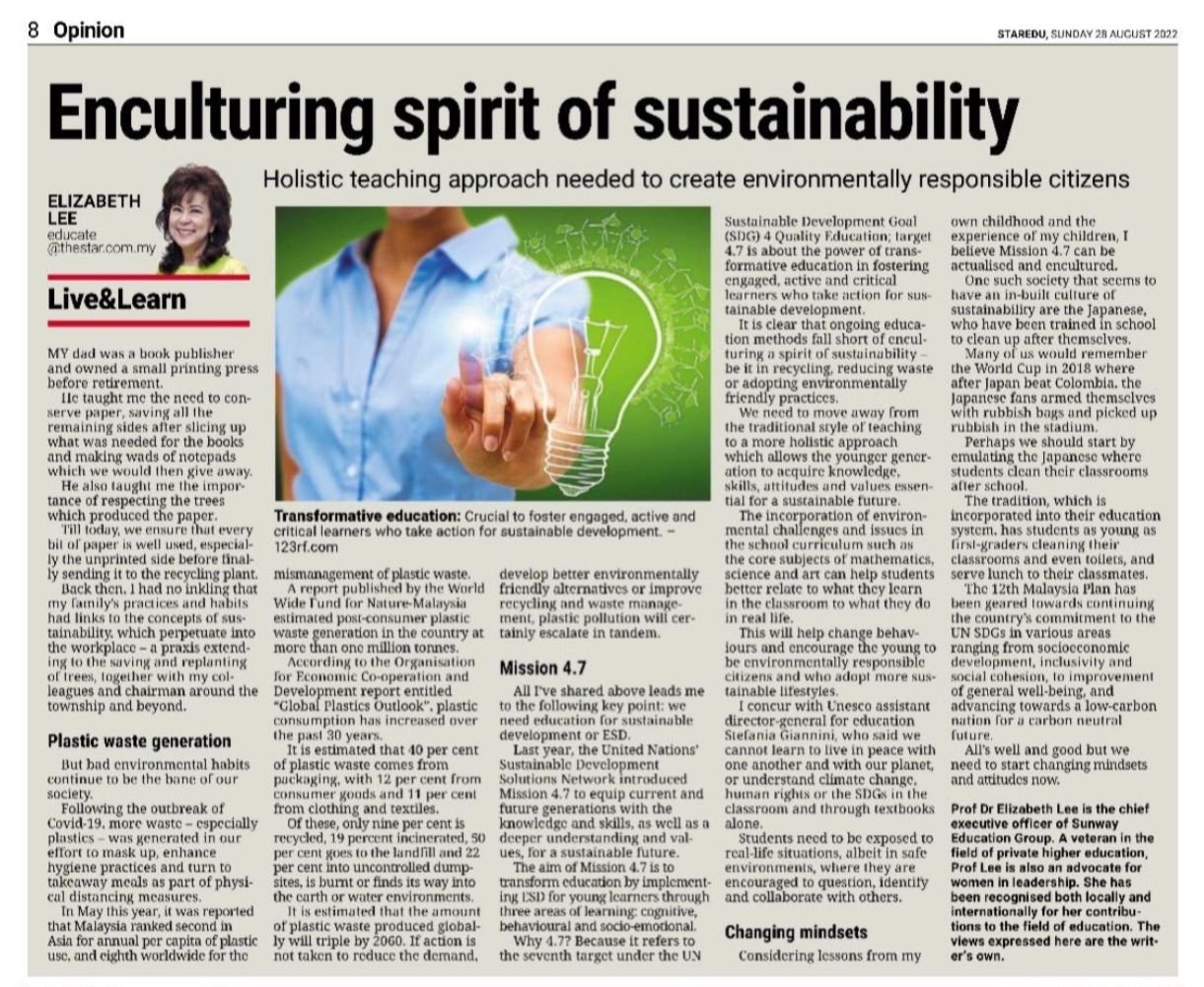Enculturing spirit of sustainability
By Elizabeth Lee, CEO of Sunway Education Group
Originally published in The Star.
My dad was a book publisher and owned a small printing press before retirement.
He taught me the need to conserve paper, saving all the remaining sides after slicing up what was needed for the books and making wads of notepads which we would then give away.
He also taught me the importance of respecting the trees which produced the paper.
Till today, we ensure that every bit of paper is well used, especially the unprinted side before finally sending it to the recycling plant.
Back then, I had no inkling that my family’s practices and habits had links to the concepts of sustainability, which perpetuate into the workplace – a praxis extending to the saving and replanting of trees, together with my colleagues and chairman around the township and beyond.
Plastic waste generation
But bad environmental habits continue to be the bane of our society.
Following the outbreak of Covid-19, more waste – especially plastics – was generated in our effort to mask up, enhance hygiene practices and turn to takeaway meals as part of physical distancing measures.
In May this year, it was reported that Malaysia ranked second in Asia for annual per capita of plastic use, and eighth worldwide for the mismanagement of plastic waste.
A report published by the World Wide Fund for Nature-Malaysia estimated post-consumer plastic waste generation in the country at more than one million tonnes.
According to the Organisation for Economic Co-operation and Development report entitled “Global Plastics Outlook”, plastic consumption has increased over the past 30 years.
It is estimated that 40 per cent of plastic waste comes from packaging, with 12 per cent from consumer goods and 11 per cent from clothing and textiles.
Of these, only nine per cent is recycled, 19 percent incinerated, 50 per cent goes to the landfill and 22 per cent into uncontrolled dumpsites, is burnt or finds its way into the earth or water environments.
It is estimated that the amount of plastic waste produced globally will triple by 2060. If action is not taken to reduce the demand, develop better environmentally friendly alternatives or improve recycling and waste management, plastic pollution will certainly escalate in tandem.
Mission 4.7
All I’ve shared above leads me to the following key point: we need education for sustainable development or ESD.
Last year, the United Nations’ Sustainable Development Solutions Network introduced Mission 4.7 to equip current and future generations with the knowledge and skills, as well as a deeper understanding and values, for a sustainable future.
The aim of Mission 4.7 is to transform education by implementing ESD for young learners through three areas of learning: cognitive, behavioural and socio-emotional.
Why 4.7? Because it refers to the seventh target under the UN Sustainable Development Goal (SDG) 4 Quality Education; target 4.7 is about the power of transformative education in fostering engaged, active and critical learners who take action for sustainable development.
It is clear that ongoing education methods fall short of enculturing a spirit of sustainability – be it in recycling, reducing waste or adopting environmentally friendly practices.
We need to move away from the traditional style of teaching to a more holistic approach which allows the younger generation to acquire knowledge, skills, attitudes and values essential for a sustainable future.
The incorporation of environmental challenges and issues in the school curriculum such as the core subjects of mathematics, science and art can help students better relate to what they learn in the classroom to what they do in real life.
This will help change behaviours and encourage the young to be environmentally responsible citizens and who adopt more sustainable lifestyles.
I concur with UNESCO Assistant Director-General for Education, Stefania Giannini, who said we cannot learn to live in peace with one another and with our planet, or understand climate change, human rights or the SDGs in the classroom and through textbooks alone.
Students need to be exposed to real-life situations, albeit in safe environments, where they are encouraged to question, identify and collaborate with others.
Changing mindsets
Considering lessons from my own childhood and the experience of my children, I believe Mission 4.7 can be actualised and encultured.
One such society that seems to have an in-built culture of sustainability are the Japanese, who have been trained in school to clean up after themselves.
Many of us would remember the World Cup in 2018 where after Japan beat Colombia, the Japanese fans armed themselves with rubbish bags and picked up rubbish in the stadium.
Perhaps we should start by emulating the Japanese where students clean their classrooms after school.
The tradition, which is incorporated into their education system, has students as young as first-graders cleaning their classrooms and even toilets, and serve lunch to their classmates.
The 12th Malaysia Plan has been geared towards continuing the country’s commitment to the UN SDGs in various areas ranging from socioeconomic development, inclusivity and social cohesion, to improvement of general well-being, and advancing towards a low-carbon nation for a carbon neutral future.
All’s well and good but we need to start changing mindsets and attitudes now.

